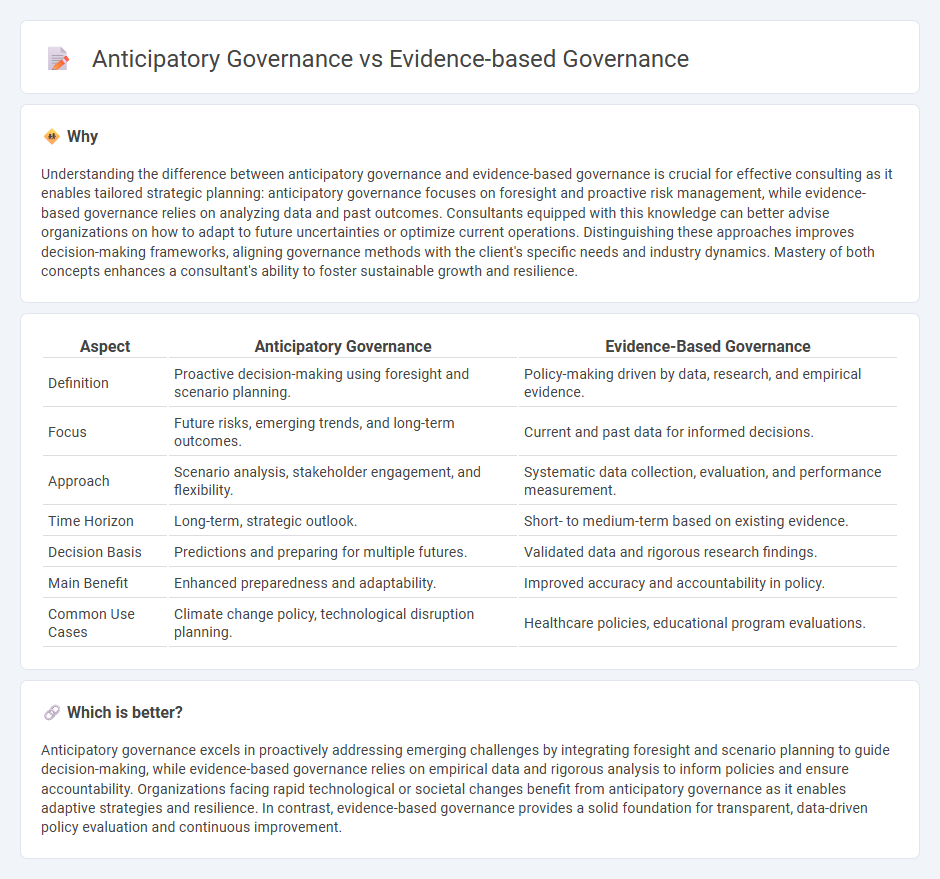
Anticipatory governance focuses on proactive strategies and foresight to address future challenges before they arise, leveraging scenario planning and emerging trend analysis. Evidence-based governance relies on data, empirical research, and rigorous evaluation to inform decision-making processes and policy implementations. Explore how integrating these approaches can enhance decision-making in consulting practices.
Why it is important
Understanding the difference between anticipatory governance and evidence-based governance is crucial for effective consulting as it enables tailored strategic planning: anticipatory governance focuses on foresight and proactive risk management, while evidence-based governance relies on analyzing data and past outcomes. Consultants equipped with this knowledge can better advise organizations on how to adapt to future uncertainties or optimize current operations. Distinguishing these approaches improves decision-making frameworks, aligning governance methods with the client's specific needs and industry dynamics. Mastery of both concepts enhances a consultant's ability to foster sustainable growth and resilience.
Comparison Table
| Aspect | Anticipatory Governance | Evidence-Based Governance |
|---|---|---|
| Definition | Proactive decision-making using foresight and scenario planning. | Policy-making driven by data, research, and empirical evidence. |
| Focus | Future risks, emerging trends, and long-term outcomes. | Current and past data for informed decisions. |
| Approach | Scenario analysis, stakeholder engagement, and flexibility. | Systematic data collection, evaluation, and performance measurement. |
| Time Horizon | Long-term, strategic outlook. | Short- to medium-term based on existing evidence. |
| Decision Basis | Predictions and preparing for multiple futures. | Validated data and rigorous research findings. |
| Main Benefit | Enhanced preparedness and adaptability. | Improved accuracy and accountability in policy. |
| Common Use Cases | Climate change policy, technological disruption planning. | Healthcare policies, educational program evaluations. |
Which is better?
Anticipatory governance excels in proactively addressing emerging challenges by integrating foresight and scenario planning to guide decision-making, while evidence-based governance relies on empirical data and rigorous analysis to inform policies and ensure accountability. Organizations facing rapid technological or societal changes benefit from anticipatory governance as it enables adaptive strategies and resilience. In contrast, evidence-based governance provides a solid foundation for transparent, data-driven policy evaluation and continuous improvement.
Connection
Anticipatory governance integrates foresight tools and scenario planning to proactively address emerging challenges, while evidence-based governance relies on empirical data and rigorous analysis to inform decision-making. Both approaches emphasize informed policy development, with anticipatory governance enhancing adaptability through forecasting and evidence-based governance ensuring decisions are grounded in robust data. The synergy between these frameworks enables governments to implement strategic, data-driven solutions that effectively respond to future uncertainties.
Key Terms
Decision-making frameworks
Evidence-based governance relies on empirical data and rigorous analysis to inform policy decisions, ensuring that outcomes are grounded in proven effectiveness. Anticipatory governance emphasizes foresight and proactive strategies, incorporating scenario planning and risk assessment to navigate future uncertainties. Explore how integrating both frameworks can enhance adaptive and resilient decision-making processes.
Predictive analytics
Evidence-based governance relies on historical data and established metrics to inform policy decisions, ensuring accountability and effectiveness through rigorous analysis. In contrast, anticipatory governance emphasizes predictive analytics to forecast future challenges and opportunities, enabling proactive strategies that address emerging trends. Explore how integrating predictive analytics enhances decision-making for resilient and adaptive governance models.
Stakeholder engagement
Evidence-based governance relies on empirical data and rigorous analysis to inform policy decisions, ensuring stakeholder input is anchored in verified facts and measurable outcomes. Anticipatory governance emphasizes proactive stakeholder engagement by incorporating foresight, scenario planning, and adaptive strategies to address emerging risks and opportunities. Explore how different governance models optimize stakeholder collaboration for resilient decision-making.
Source and External Links
Using Evidence to Shape Government & Public Policy - Evidence-based governance is a systematic approach to public policy that emphasizes decisions informed by high-quality scientific research and data analysis, aiming to increase policy effectiveness through rigorous evaluation, transparency, and ongoing monitoring.
Evidence-Based Policymaking Primer - Evidence-based policymaking involves using systematically collected, high-quality data and rigorous research methods to inform government policy decisions, enabling insights into what works, when, and for whom.
Mobilising Evidence for Good Governance - OECD - This report maps international principles and standards for using evidence in policy design, implementation, and evaluation, highlighting the OECD's effort to improve evidence-based policy making and trust in governance processes.
 dowidth.com
dowidth.com